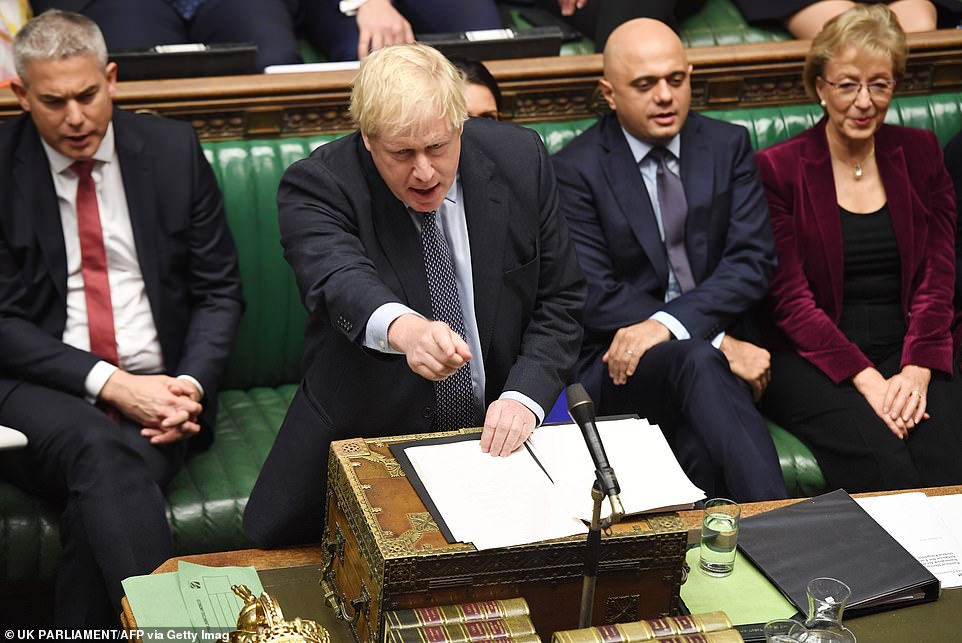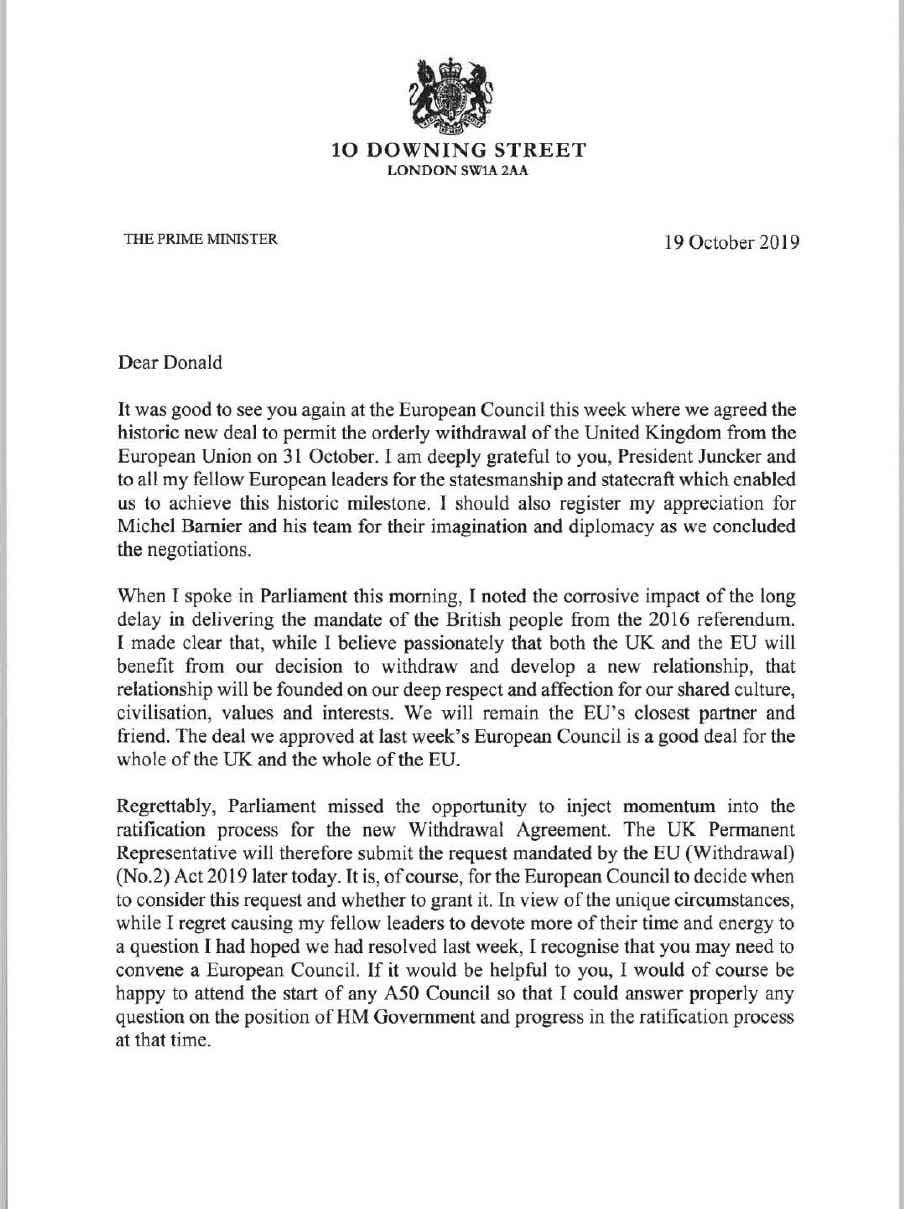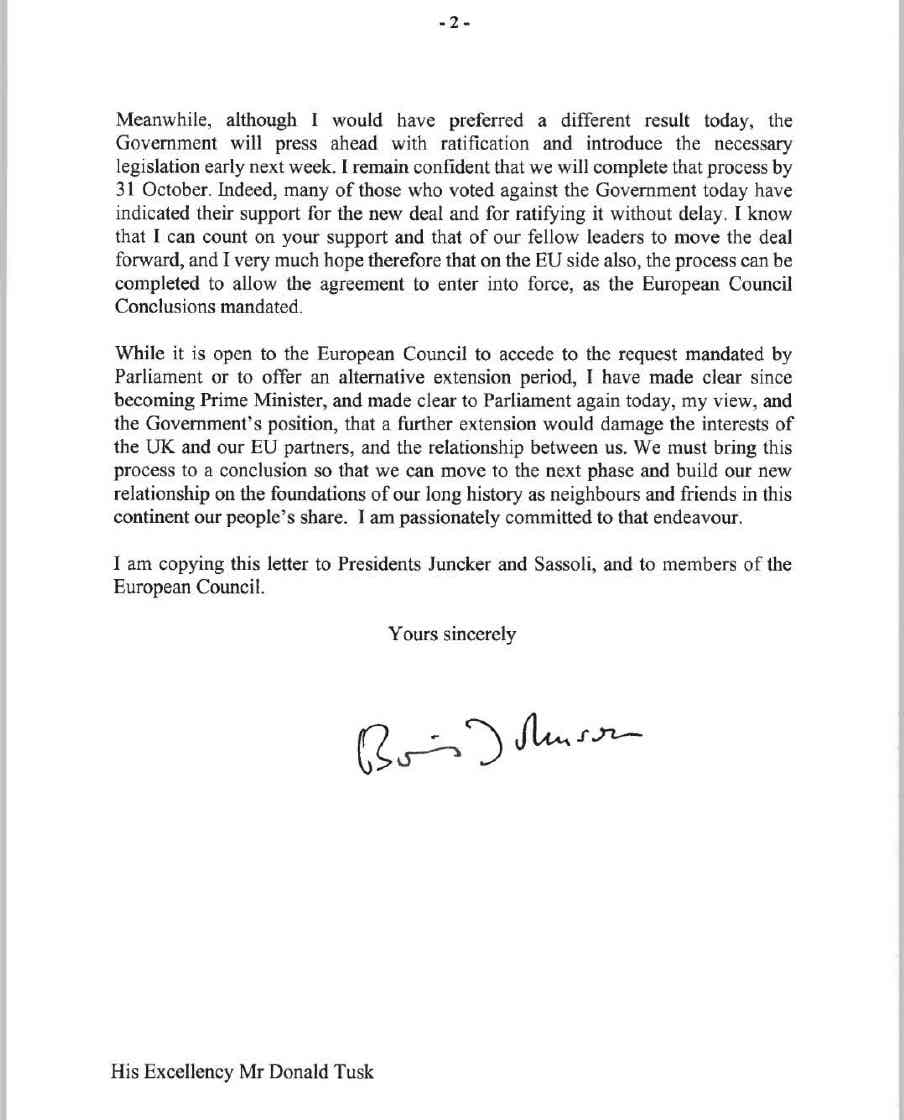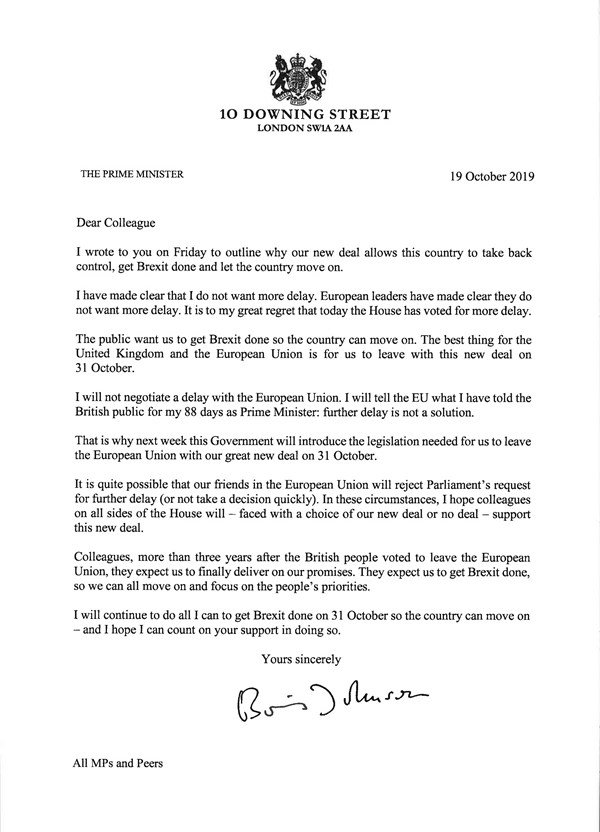On October 19th, UK Prime Minister Boris Johnson requested another delay for Brexit, this time until January 31st, 2020.
He did so by doing something puzzling. He sent three letters to the EU. And one additional letter to the UK Parliament, and specifically to the Tories.
The first one was a “photocopied” and “unsigned letter” he sent to European President Donald Tusk.
It’s text, in full, is the following:
“Dear Mr President,
The UK Parliament has passed the European Union (Withdrawal) (No. 2) Act 2019. Its provisions now require Her Majesty’s Government to seek an extension of the period provided under Article 50(3) of the Treaty on European Union, including as applied by Article 106a of the Euratom Treaty, currently due to expire at 11 p.m. GMT on 31 October 2019, until 11 p.m. GMT on 31 January 2020.
I am writing therefore to inform the European Council that the United Kingdom is seeking a further extension to the period provided under Article 50(3) of the Treaty on European Union, including as applied by Article 106a of the Euratom Treaty. The United Kingdom proposes that this period should end at 11 p.m. GMT on 31 January 2020. If the parties are able to ratify before this date, the Government proposes that the period should be terminated early.
Yours sincerely,
Prime Minister of the United Kingdom of Great Britain and Northern Ireland”
He, thus, specifically did what he said he wouldn’t: ask for an extension to Article 50 and delay Brexit past October 31st, 2019. Not that it was exactly his fault, since MPs forced his hand, but at the same time, the second letter, the signed one he sent, goes specifically against said MPs and expresses his political will, with risk of causing a huge scandal.
The second letter he sent was the Ambassador’s letter, signed by Sir Tim Barrow, the UK’s permanent representative to the EU. It’s text in full is the following:
“Dear Secretary-General,
As the United Kingdom Permanent Representative to the European Union, I invite your attention to the following matter.
Attached is a letter sent as required by the terms of the European Union (Withdrawal) (No.2) Act 2019.
In terms of the next steps for parliamentary process, Her Majesty’s Government will introduce the necessary legislation next week in order to proceed with ratification of the Withdrawal Agreement.
I would be grateful for your acknowledgement of receipt of this letter.
Sir Tim Barrow”
It is a simply bureaucratic move, required by legislation.
And finally, and most notably, Prime Minister Boris Johnson sent a letter, saying that he would not like to get an extension to Brexit, and this letter was signed.
In the signed message, he warned of the “corrosive impact” of a long delay, and that “a further extension would damage the interests of the UK and our EU partners, and the relationship between us”.
He said Parliament had “missed the opportunity to inject momentum into the ratification process” yet remained confident Brexit legislation would be passed by October 31st.
The move sparked concerns the prime minister could face fresh court action.
The Guardian cited one unnamed former Tory cabinet minister who said: “This is clearly against the spirit of the Benn Act and is not consistent with the assurances that were given by Downing Street to the Scottish courts about applying for an extension. It will also put government law officers in a very uncomfortable position.”
On October 19th, MPs in British parliament voted in favor of a Brexit extension by a majority of 16.
The first letter, Johnson sent to European leaders, including Donald Tusk, he declared was “Parliament’s letter, not my letter.”
Johnson then sent his fourth letter – to all MPs and Peers, but specifically addressed to the Tories.
Johnson insisted that he was not “daunted or dismayed” by the vote result, and remained committed to taking Britain out by October 31.
“I will not negotiate a delay with the EU, neither does the law compel me to do so,” he said.
Asked if previous statements from ministers that the Government would comply with the law as it still stood, the British Prime Minister’s official spokesman told a Westminster briefing: “governments comply with the law.”
The European Commission’s chief spokeswoman Mina Andreeva urged the UK Government “to inform us about the next steps as soon as possible”.
Labour leader Jeremy Corbyn said “despite his petulant posturing and bluster” the PM had asked for an extension, and Labour had “answers” to deal with whatever happened next.
https://twitter.com/jeremycorbyn/status/1185690221066833922
Germany and France also appear against a further extension. But a delay was likely to be given.
The chair of the Bundestag’s foreign affairs committee, Norbert Röttgen, who is a senior member of German chancellor Angela Merkel’s Christian Democrats, said he had “no doubt” an extension would be granted.
French President Emmanuel Macron tried to help Johnson in convincing Mps into backing his deal by suggesting that he was opposed to a delay. “I am not trying to read into the future but I do not think we shall grant any further delay,” he had said.
A spokesperson for the Élysée Palace said that any further delay “was not in anyone’s interest.”
The head of the International Monetary Fund, Kristalina Georgieva, said she “jumped for joy” after she heard of the new Brexit deal that would spare the UK massive economic damage.
She urged UK MPs to back the deal, saying:
“As my old boss Jean-Claude Juncker has said: ‘Where there’s a will there’s a deal.’ I hope that will holds in all quarters.”
Georgieva was joined in welcoming the news by the president of the World Bank, David Malpass, who said an agreement would remove one of the factors holding back growth in poor countries.
Georgieva identified Brexit – along with the trade war between China and the US, and geopolitical tensions – as one of the three fractures that were holding back growth.
“This is good news. This is welcome. Just like the pound, which jumped, when I saw the news I jumped. I would very much like to see an agreement being reached.”
But, despite the support from outside, the MPs decided to request an extension, and Johnson sent his signed letter to the EU President, thus UK politics is, once again, in shambles.
MORE ON THE TOPIC:








So Parliament was creative in shackling the Prime Minister. The Govt was creative in gutting an act. lol So i expect this week for barristers to work feverishly in attacking the govt’s plan or to attack the constitutionality of any act.
Like sheep the UK electorate are being herded into a very bad deal, (a regulatory authority agreement under Brussels control) simply because the establishment is now getting very jumpy.
The ruling party however will have to face a GE at some point and they will find they have alienated the NI unionists and will face a new populist political party that is anti-Eu.